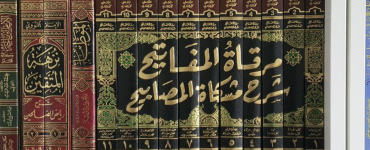بسم الله الرحمن الرحيم
Introduction
Allāh Taʿālā has blessed us with an ʿaql (intellect) over the animals, who merely act according to their desires. At the same time, however, ʿaql is not boundless and all-powerful. If we were to look at the verses of the Qurʾān closely, it is clear that its recipients (i.e. prophets) and its targets (i.e. humankind) are rational human beings, who are supposed to have the capacity to understand, interpret, and accept the message sent to them. In several instances, Allāh Taʿālā asks us to use our intellects and rationalise, and this can be categorised into four broad categories:
- Allāh Taʿālā challenges those who do not believe in him by asking them to ponder and use their ʿaqls.
- He intructs us to use our ʿaql and examine the life of the Prophet (ṣal Allāhu ʿalayhī wa-sallam) to see what motivated him to preach what he preached and where he got all the knowledge from.
- To increase our faith in Allāh even if we have already believed.
- He tells us to try and understand the meanings of the Qurʾān and Sunnah with our ʿaqls.
We learn two things from the different verses of the Qurʾān:
- One should use ʿaql to its full extent in areas that are open to rational inspection.
- To accept that some matters are simply not subject to rational understanding, and trying to “rationalise” can lead to taḥrīf (distortion). The Qurʾān and Sunnah allow us to use our ʿaqls within its proper scope yet we are also reminded that, ultimately, only Allāh is Absolute and that everything else, including man’s powers of intellect, are limited.
Mawlānā ʿUthmānī’s explanation
Mawlānā Shabbīr Aḥmad ʿUthmānī in his book Al-ʿAql wa ‘n-Naql explains how the quwwat e ʿamaliyyah (physical strength) is a composition of five things. Firstly, after the senses take in the information: 1) intellect processes it, 2) desire or fear takes place, 3) Intention/choice occurs, 4) ability/power is used, and 5) physical limbs perform the action. All this results in the outcome of one’s actions. So the ʿaql is what differentiates between good and evil, and stops a human from doing that which is harmful. It is also the linguistic meaning of ʿa-qa-la: to hold back. However, Mawlānā Shabbīr says, an aql e salim (a sound intellect) is required for this.
He explains that an ʿaql is not sound when 1) the quwat e amaliyyah hesitates to act according to ʿaql, and 2) when a person acts upon things he knows are wrong like lying, etc. Mankind is created with having desires and does not have a sound intellect, thus, they would not be able to tell the right from wrong without naql (textual evidence of the Qurʾān and Sunnah). Therefore, there is a need for a Being that knows good from evil and the different dispositions of humans who can inform us of what is right and what is evil. This is why Allāh Taʿālā Himself, has sent down the Qurʾān. Mawlānā Shabbīr says that in reality naql does not clash with ʿaql, but our intellects are deficient and limited so we are unable to understand many naqli things.
The ʿaql (intellect) and its deficiency
The ʿaql is deficient due to the following main reasons:
- ʿAql is dependent on the five senses and one’s thoughts. Thus, ʿaql being the quwwat e aqliyyah (intellectual strength) cannot perform its role without the quwwat e amaliyyah (physical strength). If one cannot see, hear, feel, speak, or smell, then their ʿaql would be very defective and weak.
- If following ʿaql was enough for existence, and for reaching tawḥīd, then Allāh Taʿālā would not have sent naql. Allāh Taʿālā sending down revelation indicates that there are things that our intellects cannot reach without it.
- Everyone’s intellect is not on the same calibre. Every society thinks differently. As time goes on, our reasonability changes whereas naql is forever and unchanging. So it makes sense to base everything upon naql since it does not change, rather than ʿaql, which changes.
- The first being who gave preference to ʿaql over naql was Iblis, because it did not make sense to him that he has to prostrate to someone who is inferior. So it was his ʿaql that resulted in his rejection.
As a result, ʿaql leads to the naql (Qurʾān and sunnah), but ʿaql cannot do the work of naql. They work together, performing different roles. ʿAql leads a person to naql, then it stops there and the naql takes over. We use ʿaql to understand naql but not to decide whether naql is worthy of acceptance. Example: In the shariʿah of Ādam (ʿalayhissalām), Qābīl was prohibited from getting married to his twin sister. That was his naql. Naql dictated that he was not permitted and if he does so, then he will be disobeying Allāh Taʿālā. However, his ʿaql told him he is more worthy of getting married to his twin sister. His ʿaql was only supposed to help him comprehend naql, not decide whether naql is justifiable or not. In this instance, his ʿaql does not have the authority to decide if he is worthy or not. Naql — which is the law of Allāh — has already clarified that he is not permitted. The only role ʿaql has here is to allow him to understand that fact.
Main positions on reason and revelation
The three main positions:
1. Rationalists like the Muʿtazilites: ʿaql over naql
Rationalists, as evident from the name, base everything upon their ʿaql. In cases of conflict, they prioritise the results of rationality over revelation (ʿaql over naql). Consequently, they have denied the existence of jinn, the questioning in the grave, the bridge of ṣirāṭ, ruʾya of Allāh, among other events that are not normally intelligible to the ʿaql.
2. Muḥaddithūn, Ẓāhiriyyah, & Ibn Taymiyyah: naql over ʿaql
This group gives predominance to naql and refused to use ʿaql at any capacity. They understand revelation in its literal (ẓāhirī) sense and deem interpretations that are not literal impermissible. They mainly use ḥadīth to understand the verses of the Qurʾān and erroneously assume their opinion is more correct than all others because their source for understanding the Qurʾān is ḥadīth whilst others who do taʾwīl for example, are speaking without proof.
3. Mutakallimūn, Ashʿarites, and Maturities: both naql & ʿaql
They refute the Muʿtazilites for granting primary authority to ʿaql. They prefer naql over ʿaql but do not entirely banish the usage of ʿaql (from their epistemology). They would use rational arguments on a great number of matters, especially for counterarguments and refuting those who base everything on ʿaql.
The universal law (qanūn kullī) of Imam Fakhr ad-Dīn ar-Rāzī (1210 C.E, Herat) is: “If revelation and reason are in conflict then:
- They must both be accepted, which is impossible as this would violate the law of non-contradiction (i.e. claiming that both ʿaql and naql are correct)
- They must both be rejected, which is also impossible as this would violate the law of the excluded middle (i.e. claiming that neither ʿaql is right nor naql)
- Give precedence to naql, which is not right since revelation is grounded in reasoning, such that if we were to give priority to the former over the latter (that is, to revelation over reason), it would be tantamount to a rejection of both reason
- Give precedence to reason over revelation, whilst also:
- make metaphorical interpretation (taʾwīl) so that the naql can match ʿaql
- or negate the apparent meaning of naql but refrain from assigning any definite meaning to it (tafwīd).”
Based on this law, the position of the Ashʿarites and Maturities is that naql is always given preference (due to it being more qatʿī than ʿaql) until we reach a point where taking the obvious meaning of the naql results to:
- Ascribing such meaning to Allāh Taʿālā, that we logically know it cannot be ascribed to Him, because if it is ascribed to him (example: Allāh Taʿālā having hand) (1) violates a rational argument used to prove the existence of Allāh or the authenticity of waḥī. (2) it would result in tashbīh: likening Allāh Taʿālā to His creation.
Hence, to avoid the above two, the mutakallimūn of the past and present either do Tanzīh maʿa ‘t-Tafwīḍ: free Allāh Taʿālā from the ẓāhīrī (literal) implications but stating that the meaning is known only to Allāh. Or they do: Taʾwīl maʿa ‘t-Tafwīḍ: interpreting the word or utalising a word that is easier for us to understand but, again, saying that the true meaning is known only to Allāh Taʿālā.
And Allāh Taʿālā knows best






